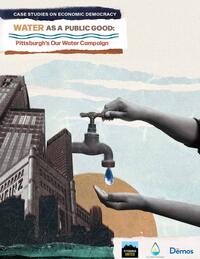In 2016, President Obama declared a state of emergency over the contamination of the water system in Flint, Michigan, a poor, majority-black city.
The crisis was seen as a failure of the government to protect the public after years of disinvestment and neglect of aging infrastructure. “There would not have been a water crisis if we had democracy in the city,” said Nayyirah Shariff, director of the nonprofit coalition Flint Rising. “We didn’t have the chance for residents to weigh in.” Flint is not alone. A Government Accountability Office audit found that, from 2014 to 2016, over 1,400 water systems across the country reported water samples with high lead levels, according to Environmental Protection Agency (EPA) guidelines. Combined, those water systems served roughly 3.2 million people.
In recent years, the tap water in much of Pittsburgh, Pennsylvania had lead levels high enough to cause “serious health problems,” the local utility warned. The contamination violated EPA guidelines and was comparable to that in Flint, but received less attention. And like Flint, the problem was exacerbated after the government turned over the management of its essential water infrastructure to an unaccountable corporation, Veolia, which sought quick profits at the expense of the public welfare.
It should go without saying that water and other basic goods are essential to life—and thus to economic well-being. Clean, affordable water is a prerequisite for employment, safe housing, and school attendance. Yet, in low-income, mostly Black and brown communities across the country, water infrastructure is undermined by economic inequality and systemic racism.
For decades, the federal government has invested less and less of its annual budget in all kinds of public infrastructure: from “hard” infrastructure, like water systems and bridges, to “soft” infrastructure, like education and caregiving. This disinvestment gave rise to privatization and a loss of faith in government and civic institutions, putting our democracy at risk.
Government officials should be responsible for redressing past wrongs and providing access to clean water. But in Pittsburgh, it was up to community organizations in affected neighborhoods to demand that the city live up to its obligations and keep the water system public.
The fight in Pittsburgh showed that people can successfully resist the corporatization of essential infrastructure. Community leaders forced the city to provide safe, accessible, and affordable water—and developed an accountability model in the process, by which ordinary people can oversee the public water utility. Organizers mobilized residents to emphasize a simple message: water must remain a public good.
Download the Full PDF

